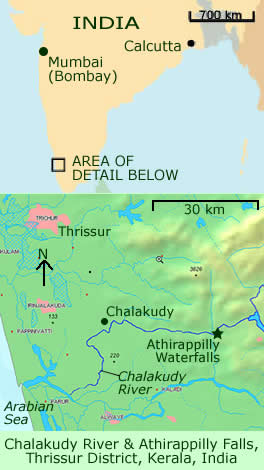Opponents of a proposed dam on the Chalakudy River in central Kerala, which will destroy a Kadar village, are launching a scientific investigation to study the management of the entire river system. The proposed dam would have a severe impact on the nearby Athirappilly waterfalls, a major tourist attraction for the region, and, its opponents claim, it will have a devastating effect on the biodiversity of the entire river basin.
 The Chalakudy River Protection Forum (Chalakudy Puzha Samrakshana Samithi), which is leading the opposition, announced last week that it will be working with another group, the Forum for Policy Dialogue for Water Conflicts, to assess all the uses of the river as a way of trying to propose balances that will solve the problems. Dr. A. Latha, who directs the Chalakudy River Protection Forum, indicates that her group has mapped the river, including the human uses, as a first step to understanding the issues relating to the ecosystem.
The Chalakudy River Protection Forum (Chalakudy Puzha Samrakshana Samithi), which is leading the opposition, announced last week that it will be working with another group, the Forum for Policy Dialogue for Water Conflicts, to assess all the uses of the river as a way of trying to propose balances that will solve the problems. Dr. A. Latha, who directs the Chalakudy River Protection Forum, indicates that her group has mapped the river, including the human uses, as a first step to understanding the issues relating to the ecosystem.
Dr. Latha, a scientist, believes that many people do not understand that a river basin needs to be viewed as a single ecological body, which is affected by upstream as well as downstream interventions. Most techno-centric approaches to river systems are fundamentally flawed, she argues. She gives an example of poor, techno-centric management: “When the water meant for paddy cultivation is used for other crops, then there is every possibility that it gets exhausted midway and never reaches downstream.” This can cause conflicts, she says.
An article by Rajeev Raghavan in the journal Biodiversity and Conservation (2008, vol. 17(13), p. 3119-3131) pointed out that the Chalakudy River is one of India’s premier biodiversity hotspots, particularly for fish species. Out of the 71 species of fish identified in the study, 16 are endangered and 4 are critically endangered. Three of the four species on the critically endangered list are endemic to the Chalakudy River.
The indefinite satyagraha campaign launched in February 2008 by the opponents of the dam to protect the ecosystem and its human inhabitants is apparently still going on. According to Dr. Latha, “for the first time in the history of Kerala a dam project is being opposed not on the grounds of rehabilitation issues or forest loss, but on the cumulative impacts of reservoir operations.” Her group feels that effective reservoir management may help resolve the water problems in Kerala and lead to a resolution of the dam controversy.